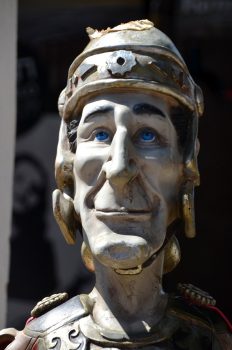French Etymology: Gaulish Edition Posted by Elizabeth Schmermund on Apr 23, 2018 in Vocabulary
Last week, we went over the interesting history of the Battle of Alésia and the downfall of Vercingétorix and the Gauls. (Interesting fact: Did you know that the Gauls kept their birth names secret? They believed that if someone knew their real name, it diminished their power. Vercingétorix is an honoary title that most likely means “great warrior king.”) This week, let’s go over the lasting heritage of the Gauls (and the misunderstanding and politicization of Gaulish heritage, as well).
After the French Revolution, the Gauls became a symbol for French ancestry and for resisting foreign or unrepresentative powers. Classic French textbooks commonly used the phrase Nos ancêtres les Gaulois… (Our ancesters the Gauls…) While this is true to some extent, it’s not the whole truth. While many people living in mainland France can trace back their heritage to the Gauls, they also might be able to trace it back to the Romans, the Normans (who descended from Norse groups), the Franks (a Germanic tribe after which France is named), Mediterranean populations, and, of course, African, North African, and Middle Eastern populations. Some French people today have spoken out about the perhaps racist undertones of the focus on Gaulish ancestry (see this article to read more about this). As historian Suzanne Citron states, the Gauls were actually a wide-ranging group who did not originally have much in common besides occupying what would become modern France. She states, “the ‘fantastical’ idea of a pure ethnic Gallic race being the founders of the true French is damaging as it ‘denies the racial and cultural diversity that constantly accompanied the historical creation of France.’”
That being said, the influence of the Gauls on French history is undeniable … particularly if you look at the French language itself. While the Gaulish language is long extinct, the modern language that has adopted the most “loanwords” from it is … you guessed it, French. According to Henriette Walter, there are approximately seventy words of Gaulish origin in French, most of which relate to the natural world, hunting, and fishing. They include:
Une alouette (a lark)
le mouton (sheep)
La charrue(plough)
le soc (ploughshare)
la mine (mine)
le sillon (furrow)
le gobelet (beaker)
la dune (dune)
la bruyère (heather)
le galet(pebble)
la lande (moor)
le sapin (fir tree)
le chêne (oak tree)
le bouleau (birch tree)
l’if (yew tree)
There’s also one body part with a Gaulish name: l’orteil, or the toe. Some linguistics even link the verb aller (to go) with the Gaulish word synonym allu.
Of course, there are many other ancient languages that have enriched the modern French language, including words of Breton origin. It seems like, in the French language at least, Gaulish heritage does live on.

Build vocabulary, practice pronunciation, and more with Transparent Language Online. Available anytime, anywhere, on any device.




